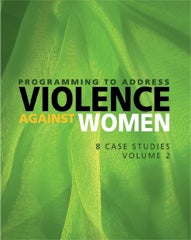News
Ending Violence Against Women
- 10 February 2009
News
New York --- In Guatemala, women are mutilated and murdered with impunity. In India, the physical and psychological effects of assaults, burns, battery and rape wreak havoc on women’s development and endanger their lives. In Zimbabwe, domestic violence occurs across all sectors of society.
Violence against women is a pervasive and, in many cases, deeply entrenched form of discrimination. It continues in every part of the world, often shrouded in a culture of silence. It denies women their fundamental right to live without fear, and, all too often, cuts short their very existence. Ending this violence is both a human rights imperative and a public health priority.
Because violence against women is often so deeply embedded within cultures, and so linked to gender inequities and power relations, it must be addressed strategically, sensitively and comprehensively. A new volume of case studies documents successful approaches in eight countries.

“Programming to Address Gender- based Violence” is the second volume of case studies published by UNFPA, the United Nations Population Fund, that examines efforts to effectively address these issues. Taken together, the case studies provide a wealth of information that can guide development practitioners.
Many of the programmes use reproductive health interventions as an entry point for identifying victims and providing counselling and referrals. Specific approaches are geared to the specific contexts in which the violence occurs. For instance:
In India and Nepal, national partners worked together to institutionalize a coordinated response to violence against women with a special focus on using the health system as an entry point.
In Indonesia and Honduras, police and faith-based organizations were trained to respond sensitively to the issue.
In various countries, governments drafted and passed national legislation and policies such as the Domestic Violence Act in Zimbabwe and the National Strategy to Combat Violence Against Women throughout the Life Cycle in Algeria.
In Guatemala, much progress was achieved through coordination and synergy between the national and local governments.
In Sri Lanka the government and national NGOs provided gender-responsive psychosocial support for women and communities affected by the tsunami.
Throughout these efforts, UNFPA provided a strong supportive role to national governments and civil society.